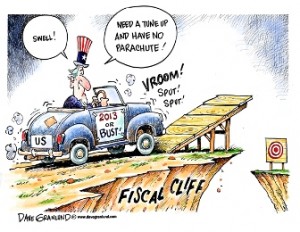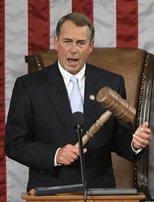 “Here’s another fine mess you’ve gotten me into!” said Oliver Hardy to Stan Laurel every time Stan had, indeed, gotten them into another fine mess.
“Here’s another fine mess you’ve gotten me into!” said Oliver Hardy to Stan Laurel every time Stan had, indeed, gotten them into another fine mess.
That’s also what Republicans are saying to Democrats and what Democrats and saying to Republicans with regard to the latest high concept blockbuster:
The Fiscal Cliff.
If this were a movie where the writer was challenged to come up with the best high-stakes, dramatic, yet farcical storyline, they could not do better than what Congress has created with our federal budget.
So, who’s to blame? Let’s get that out of the way first, shall we?
It all starts with the Great Recession. That is the dark, powerful and mythical beast that lurks beneath our village; it is the Kraken of our story that has risen to devour us.
 The only thing that keeps the Kraken at bay is money. Money must be liquid, flowing throughout the land, and the economy must maintain some kind of growth before such a time when tranquility can reign over our village again. Any step backward and the ferocious beast will consume us into a depression.
The only thing that keeps the Kraken at bay is money. Money must be liquid, flowing throughout the land, and the economy must maintain some kind of growth before such a time when tranquility can reign over our village again. Any step backward and the ferocious beast will consume us into a depression.
During the great, contentious, partisan, economic debate a couple of years ago, the President and Democrats in Congress, were committed to the only economic paradigm that has any track record of working in such dire circumstances, and that is the principle of Keynsian economics that promotes government stimulus.
It is based on the historical fact that the private sector cannot (and will not in financially uncertain times) put enough money into circulation to stimulate growth and create jobs. Therefore, the federal government, through tax breaks, granting loans and borrowing capital, uses spending to reverse the downward spiral into economic depression.
It has worked (although, opposition will say otherwise) and that is evidenced by the fact that job loss ended and positive job creation began in March of 2010. However, more debt was created, and that has been the only foothold Republicans have needed to oppose it.
What is lost in the screaming debate that has ensued is that debt goes down when production goes up and that is the eventual result of stimulus. But in these bitter, partisan times of hyperbole and hatred, patience is not a participant. The now notorious “Debt Ceiling” cornered that debate in 2011 when the President asked Congress to raise it in order to keep from defaulting on loans. It has been raised, for the record, without controversy, throughout our history (George W Bush raised it 7 times, and raised the debt in terms of percentages far more than the current administration) in order to keep our national credit rating perfect.
The concept is predicated on believing that America will prosper and the fact that our economy has grown exponentially in the past 30 years, but it was the attack angle for Republicans to exploit in order to compromise Obama’s presidency.
Desperation to raise the ceiling caused a desperate compromise between the White House and Republicans in Congress and that compromise is what has brought us to (drumroll) The Fiscal Cliff.
 Boehner’s Republican controlled House insisted that in order to raise the ceiling to avoid defaulting, a 10% mandatory reduction in federal spending (budget sequestration) would have to be made in January of 2013. This was an easy sell to the American people who have been led to believe that the federal government is no more than a giant household and that principles of spending, debt and credit are the same.
Boehner’s Republican controlled House insisted that in order to raise the ceiling to avoid defaulting, a 10% mandatory reduction in federal spending (budget sequestration) would have to be made in January of 2013. This was an easy sell to the American people who have been led to believe that the federal government is no more than a giant household and that principles of spending, debt and credit are the same.
Falderal, to be sure, since we don’t, as a household, print our own money, collect taxes, trade with foreign countries, and we aren’t individually responsible for national security, public education and disaster relief, but we’ll leave that alone for now. Suffice to say, that many American’s are convinced that mandatory and massive austerity measures are a good thing.
Coincidentally, the Bush tax cuts are set to expire at the same time. So, now we face The Fiscal Cliff; if the tax cuts are extended there will be less revenue, coupled with reduced budgets, which could slide us back toward a recession, or… we can allow the tax cuts to expire, thereby raising taxes, and risk decreased spending and…slide back into a recession. Regardless, a 10% federal spending cut will create job loss (over a million estimated in science and research) and put us on a negative growth path that could jeopardize the economy.
A recession is not reversed through austerity cuts, but rather, through capital liquidity, and so this is a conundrum to be sure.
So…what’s the solution?
Wealthy Americans are the only people who can afford to pay what we need to avoid falling off the cliff. And guess what? They’ll do fine even if their taxes are raised. Plenty of wealth was created with MUCH higher marginal rates than what we have now.
There is a psychology to wealth, however. Once a person reaches a degree of affluence, their primary goal is to keep it and improve upon it. There is no metamorphosis into becoming a Job Creator, the only change is that they discover they can never have enough and they will bristle at taxes that take money from their personal accumulation. Simple truth.
Wealth, however, is not created as a result of lower taxes,it is created when average Americans can spend more money. There is no solution if we take more out of our pockets.
The Bush tax cuts will expire and the top tax rate will be back up to 39 percent. Sit down, Republican friends– they are scheduled to expire! The Taxation Mardi Gras that the top 2% have enjoyed for a decade is over and they will pay more, but now— nominal rates for the rest of us can be cut back.
Next we need to put reform on shelters (this was proposed by Republicans and later taken away) on the table. They must be implemented to eliminate high value deductions that the wealthy exploit. Granted, Republicans suggested such provisions while also proposing tax reductions and so this will be a stumbling block, but by going back to a more progressive tax structure we will, in theory, produce more income.
Next, Dodd-Frank must be modified so that it actually works. It was adopted to end the financial maneuverings on Wall Street that led to toxic assets and a House of Derivative Cards, but it is hurting small banks. Dodd-Frank should apply only to large financial firms, and reforming it will reduce the new regulatory burdens that are strangling Main Street lending.
This compromise will give Boehner a boner (I’m so sorry! I’ve been trying to use that phrase for two years and this seemed like the best opportunity I’ll ever get):

As dividends become ordinary income, we should change corporate tax rules to end double taxation on their dividends. Dividends should be the same as collecting interest in the eyes of corporate tax collectors.
And there’s more to be bled from the Democrats in this Grand Compromise Solution- raise the Real Estate Tax threshold! It follows the age-old premise that money should be taxed when it’s EARNED and not when it’s invested, and allowing for more immunity from taxes on real estate, eases a burden on the wealthy. Some of you won’t care about “easing” any burden on those who can afford burdens, but we don’t get anything if we don’t give anything.
Finally, we should put Pigovian taxes on the table. For those who may think that is the taxing of pigs, let me clarify.  Pigovian taxes are regressive taxes that put a tax onto activities that produce a negative outcome. Carbon emissions, cigarettes, even gasoline consumption. There are pros and cons to each, but large amounts of revenue can be created that can be used toward necessary programs. Education and health in particular. Austerity measures to either would be costly to our future prosperity and Pigovian taxes can make up for budget losses elsewhere.
Pigovian taxes are regressive taxes that put a tax onto activities that produce a negative outcome. Carbon emissions, cigarettes, even gasoline consumption. There are pros and cons to each, but large amounts of revenue can be created that can be used toward necessary programs. Education and health in particular. Austerity measures to either would be costly to our future prosperity and Pigovian taxes can make up for budget losses elsewhere.
It can be argued that regressive taxes place a greater burden on lower incomes, but the revenue generated can offset those burdens as well as steer society toward better (cost saving) alternatives. Yeah, yeah, yeah…that’s “social engineering” and some people break into hives at such a thought, but “social engineering” includes education, health benefits, seatbelts, car seats and tax breaks.
“Tell me what ISN’T ‘social engineering,” says Stan as he flutters his tie.